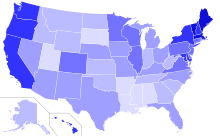Massachusetts liberal

Massachusetts liberal is a phrase in American politics which is generally used as a derogatory political epithet by Republicans against Democrats who are from the Commonwealth of Massachusetts.[2][3] It was most significantly used in the 1988 presidential race by then-Vice President George H. W. Bush against Governor Michael Dukakis, and again in the 2004 race by then-President George W. Bush against Senator John Kerry (who was Dukakis's lieutenant Governor).[4] The Democratic candidates (Dukakis, Kerry) lost both races. In the Republican 2012 presidential primary election Newt Gingrich used the phrase "Massachusetts moderate," based on the liberal pejorative, repeatedly against Mitt Romney,[4] the former Governor of Massachusetts, whose main residence was a mansion in the state.[5] Romney went on to win the nomination, but lost the presidential election.
Massachusetts is one of the most liberal and Democratic-leaning states in the country. It was the first state where same-sex marriage became legal in 2004.[6] It has the highest percentage of adults with college degrees of any state in the country.
Meanings of the phrase[edit]
This section has multiple issues. Please help improve it or discuss these issues on the talk page. (Learn how and when to remove these template messages)
|

The idea behind the usage of the phrase is that the state of Massachusetts is "against the mainstream" in comparison to other states. Jane Elmes-Crahall, a professor who studies political rhetoric, has said, in swing and red states, "It [the phrase] still signals the antithesis of their [swing- and red-state] social and economic values." Hence, it is believed, voters in these states are unlikely to support a Democratic nominee that they believe to be a "Massachusetts liberal."[7]
There are several specific ideologies that are implied in the phrase:
- Being "soft on crime"; specifically, an example of this was the infamous Willie Horton incident, which was referenced by George H. W. Bush's presidential campaign against Governor of Massachusetts Michael Dukakis in 1988. Willie Horton was a convicted murderer who raped a woman while on a furlough granted by Dukakis.[8]
- Alleged support for higher taxes. Among some, the state has a reputation for high taxes (6.25% sales tax,[9] 5.05% income tax), and some refer to it as "Taxachusetts."
- Support for anti-war ideas. This particular inference comes from the 1972 Presidential race, when Massachusetts was the only state where antiwar Senator George McGovern defeated President Richard Nixon.
- In more recent times, such as the 2004 presidential race, the term also is meant to point to the state's legalization of same-sex marriage.
See also[edit]
References[edit]
- ^ Jones, Jeffrey M. (2019-02-22). "Conservatives Greatly Outnumber Liberals in 19 U.S. States". Gallup. Retrieved 2021-12-27.
- ^ "2020 White House race tests if 'Massachusetts liberal' label still a political loser". Washington Examiner. 2019-11-17. Retrieved 2020-08-01.
- ^ NJ.com, Claude Brodesser-Akner | NJ Advance Media for (2017-08-22). "Christie: Phil Murphy 'the worst kind of Massachusetts liberal'". nj. Retrieved 2020-08-01.
- ^ a b Editorials, The Republican (2012-01-12). "Editorial: A view of Massachusetts out in the heartland". masslive. Retrieved 2020-08-01.
- ^ Ryan, Andrew; Levenson, Michael (2012-01-10). "'Mass. moderate' insult has local Republicans wincing". Boston.com. Retrieved 2018-06-29.
- ^ Elaine Kamarck (2004-07-25). "Can outdated label still hurt Kerry?". The Boston Globe. Archived from the original on September 8, 2006. Retrieved 2007-05-14.
- ^ Susan Page and Jill Lawrence (2004-07-11). "Does 'Massachusetts liberal' label still matter?". USA Today. Retrieved 2007-05-14.
- ^ The Baltimore Sun: How A Murderer And Rapist Became The Bush Campaign's Most Valuable Player November 11, 1990.
- ^ Massachusetts Department of Revenue
